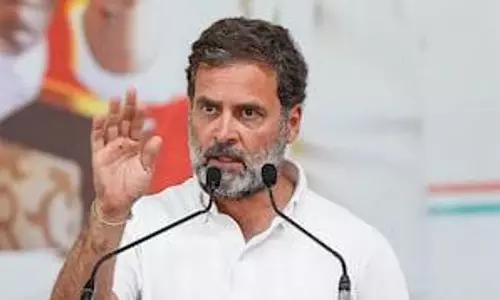
The Centre's high-handedness in Puducherry
text_fieldsThe unusual step of a sit-in strike by V Narayana Swamy, chief minister of the Union Territory of Puducherry before the state assembly building in protest against the anti-democratic steps of Lieutenant Governor (LG) Kiran Bedi, came to an end after six days. However, some apprehensions still linger. The dharna that was staged by the chief minister and his cabinet colleagues in front of 'Raj Nivas' from 13 February was against the cited cases of Kiran Bedi misusing her discretion by withholding approval for 40 schemes including old and widow pensions that were approved by the cabinet.
This is an allegation that has been raised repeatedly by the elected government of Puducherry over the last two years. And the fact that the high-handedness of the LG, who is a nominee of the President, has been pushing back the territory's developments, was brought to light several times with evidence by the Congress-DMK coalition government of Puducherry. It was when Kiran Bedi did not soften her stand even after such disclosures, that Narayana Swamy was constrained to take the extreme step of the direct action. And that won big support. A similar victim of the LG rule, Delhi chief minister Arvind Kejriwal, flew in and expressed in person his support for the strike. Later, Narayana Swamy ended his strike following discussions held with Kiran Bedi in which most of their demands were conceded. Kiran Bedi has informed that urgent steps will be taken in the matter of welfare pensions, teachers' appointments and free rice ration supply. Even after that, Narayana Swamy has claimed that his strike was only a 'partial victory', and therein lie some hints about the political uncertainties that underlie the issues.
In general, centre-governed territories are regions on which special status is conferred due to certain special geographic, historic and administrative reasons. In other words, they are pockets within the federal structure, whose rule is handled by the Centre directly. However, among the seven union territories of the country, Delhi and Puducherry are not ruled by the Centre, and instead 'semi-state' governments do exist in both places,. This implies that in both places, elected governments function with limited powers. And above such elected governments, a nominee of the President (in effect the central government) as the Lieutenant Governor is given certain definite powers and it is through this range of authority that the Centre is intervening in the administration of Delhi and Puducherry. Barring any major conflicts between the Centre and the 'states', this is a mechanism that moves smoothly. But the parties wielding power in both Delhi and Puducherry are non-BJP parties. It can be assumed that Modi government which generally revels in interfering in the jurisdiction of the state governments, has set an eye specifically on these two 'hostile states'. The Centre is thus using thG's, who are generally made to descend from above, to interfere with the administration of Delhi and Puducherry.
Puducherry in a way shows a continuation of what happened in Delhi six months ago, where Arvind Kejriwal staged a sit-in strike at the official resiodence of Delhi Governor Anil Baijal - the only difference being that instead of Baijal in Delhi, it is Kiran Bedi in Puducherry – and both confidant/es of Modi. It was when Baijal poked his nose into every aspect of administration and brought the whole state to a standstill that Kejriwal blew the trumpet of a strike and ventured for a legal battle. Baijal blocked the drinking water supply of Delhiites, cancelled the decision to start 1,000 primary health centres, and finally even after Supreme Court entered into action, Baijal continued with his 'interventions'. And Bedi is re-enacting the same things in Puducherry. This should not be reduced to be seen as a mere power dispute. Such measures are to be viewed as attempts to destroy the country's federalism using the governors. And several chief ministers of states have raised the complaint that the Centre is trying to usurp the powers of states and trying to enforce totalitarianism, a feeling quite strong in southern states. There was a situation in which Kerala chief minister was even denied audience with the prime minister. Most of these acts smack of a fascist regime. And what Kejriwal and Narayana Swamy are doing is a fight against such political domination. In that sense, they also constitute a struggle against fascism itself. It may be for that reason that Kejriwal called Naraya Swamy's strike as a struggle against autocracy.























